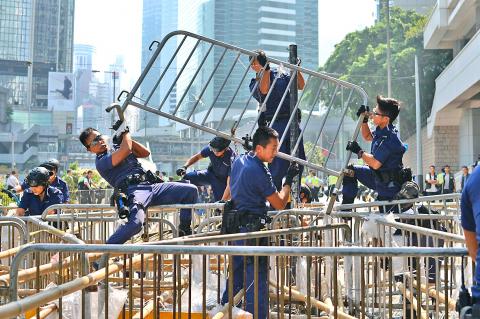Hong Kong police yesterday vowed to tear down more street barricades manned by pro-democracy protesters, hours after hundreds of officers armed with chainsaws and boltcutters partially cleared two major roads occupied for two weeks.
In a concerted effort to reduce the territory held by protesters, police tore down barricades in the bustling shopping district of Causeway Bay and on the edge of the main protest encampment in Admiralty, near the city government’s headquarters. They also vowed to target protester cordons in Mongkok, a working-class district known for its triad gangs, where violence has previously broken out.
Huge crowds have intermittently rallied against China’s insistence that it will vet candidates standing for election as the semi-autonomous city’s next leader in 2017 — a move protesters have labeled “fake democracy.”

Photo: AFP
While the activists have been praised for their civility and organizational skills, they have also brought widespread disruption to an already densely populated city. Angry and sometimes violent scuffles have broken out between demonstrators and government loyalists, sparking accusations the authorities are using hired thugs to sow trouble.
Police had been keeping a low profile at the three main protest sites after a decision to fire tear gas at peaceful demonstrators on Sept. 28 caused outrage and encouraged tens of thousands to take to the streets.
However, in the past two days, officers have begun probing protester defences in raids aimed at opening some roads to traffic, while allowing the bulk of demonstrators to stay in place. About 150 police dismantled metal barricades at the Causeway Bay site before dawn yesterday, freeing up traffic in one direction, but leaving the protest camp there largely intact.
Hours later, another contingent of officers tackled barricades at the main Admiralty site, using chainsaws to slice through bamboo poles and freeing up one of the multi-lane highways in the district.
At both sites protesters put up little resistance, sticking to their promise of non-violence.
Some protesters were seen sobbing as police went to work dismantling the barricades.
“We are only residents and students,” one tearful young woman shouted at police. “We will leave, as we are unable to fight you, but we will not give up.”
Police insisted they would soon turn their attention to Mongkok.
A similar clearance operation on Monday at the edges of the Admiralty protest camp prompted activists there to swiftly regroup.
They laid down cement foundations and built up bamboo pole barricades blocking both lanes of a highway, using everything from steel chains to plastic cable ties and sticky tape to strengthen them — even enlisting sympathetic construction workers for help.
However, police yesterday cleared them in less than an hour.

SECURITY: As China is ‘reshaping’ Hong Kong’s population, Taiwan must raise the eligibility threshold for applications from Hong Kongers, Chiu Chui-cheng said When Hong Kong and Macau citizens apply for residency in Taiwan, it would be under a new category that includes a “national security observation period,” Mainland Affairs Council (MAC) Minister Chiu Chui-cheng (邱垂正) said yesterday. President William Lai (賴清德) on March 13 announced 17 strategies to counter China’s aggression toward Taiwan, including incorporating national security considerations into the review process for residency applications from Hong Kong and Macau citizens. The situation in Hong Kong is constantly changing, Chiu said to media yesterday on the sidelines of the Taipei Technology Run hosted by the Taipei Neihu Technology Park Development Association. With

CARROT AND STICK: While unrelenting in its military threats, China attracted nearly 40,000 Taiwanese to over 400 business events last year Nearly 40,000 Taiwanese last year joined industry events in China, such as conferences and trade fairs, supported by the Chinese government, a study showed yesterday, as Beijing ramps up a charm offensive toward Taipei alongside military pressure. China has long taken a carrot-and-stick approach to Taiwan, threatening it with the prospect of military action while reaching out to those it believes are amenable to Beijing’s point of view. Taiwanese security officials are wary of what they see as Beijing’s influence campaigns to sway public opinion after Taipei and Beijing gradually resumed travel links halted by the COVID-19 pandemic, but the scale of

A US Marine Corps regiment equipped with Naval Strike Missiles (NSM) is set to participate in the upcoming Balikatan 25 exercise in the Luzon Strait, marking the system’s first-ever deployment in the Philippines. US and Philippine officials have separately confirmed that the Navy Marine Expeditionary Ship Interdiction System (NMESIS) — the mobile launch platform for the Naval Strike Missile — would take part in the joint exercise. The missiles are being deployed to “a strategic first island chain chokepoint” in the waters between Taiwan proper and the Philippines, US-based Naval News reported. “The Luzon Strait and Bashi Channel represent a critical access

Pope Francis is be laid to rest on Saturday after lying in state for three days in St Peter’s Basilica, where the faithful are expected to flock to pay their respects to history’s first Latin American pontiff. The cardinals met yesterday in the Vatican’s synod hall to chart the next steps before a conclave begins to choose Francis’ successor, as condolences poured in from around the world. According to current norms, the conclave must begin between May 5 and 10. The cardinals set the funeral for Saturday at 10am in St Peter’s Square, to be celebrated by the dean of the College